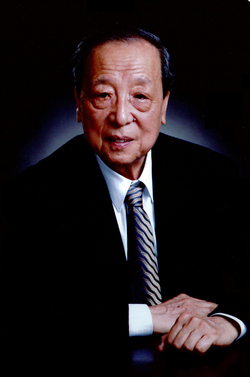Li Xueqin


Professor Li Xueqin
Doctor of Letters, honoris causa (2012)
Professor Li Xueqin was born in Beijing in 1933 and has studied at the Department of Philosophy of Tsinghua University. He is Director of the Institute of History of the Chinese Academy of Social Sciences, Vice-President of the Society for Research on Chinese History, President of the Councillors of the Chinese Society for Research on the Pre-Qin History, Director of the Institute of International Chinese Studies at Tsinghua University, group leader and chief scientist of the “Xia-Shang-Zhou Chronology Project”. He is also academician of the International Academy of Sciences of Europe and Asia and honorary member of the Society for Oriental Studies of the United States of America.
Over the past 60 years, Professor Li has been principally engaged in the research of ancient Chinese history, palaeography, archaeology, and bibliography. He has made major contributions to the research areas of oracular bone inscriptions, bronze implements, scripts of the Warring States Period, bamboo slips and silk writings and their related history and culture. He is historian, archaeologist and bibliographer rolled into one, well-known for his application of interdisciplinary approaches in research. He has published over 60 works thus far.
In the 1950s, through examination and consolidation of the oracular bones unearthed at Yinxu, the ancient capital of Shang Dynasty, with particular attention to the historic events and geography involved and using a systemic approach based on bone inscriptions and the jin script, Professor Li made major contributions to research of the system of rites, officialdom, family, and law during the Shang and Zhou Dynasties. By systematically studying jin scripts, pottery scripts, ancient seals, coin inscriptions and bamboo strips and silk writings, Professor Li has contributed to developing the studies of Warring States scripts into a new branch of Chinese palaeography, establishing himself as the pioneering scholar of the field.
Since 1975, Professor Li has presided over and been involved in projects to systematize the materials from Mawangdui Silk Texts, Dingxian Han Slips, Yunmeng Qin Slips, and Zhangjiashan Han Slips. On the basis of these new materials, his research with regard to the academic and cultural history in the Warring States Period and early Han Dynasty has been widely applauded in the academia. Professor Li has also made significant contributions to the studies of Changsha Chu Silk Texts, Baoshan Chu Slips, and Guodian Chu Slips, and Chu Slips in possession by the Shanghai Museum.
Professor Li Xueqin has presided over numerous major research projects including the world-renowned “Xia-Shang-Zhou Chronology Project” under the nation’s Ninth Five-Year Plan, as well as the “China Ancient Civilization Exploration Project”—a key technological directive under the nation’s Tenth Five-Year Plan. The Chronology of Xia-Shang-Zhou, compiled under his supervision, grabbed the attention of academics worldwide.
Since 2009, Professor Li Xueqin, in the capacity of Director of the Unearthed Research and Protection Center of Tsinghua University, led a team of researchers to conduct studies on the bamboo slips of the Warring States Period in possession by the university. Significant discoveries have been made as a result of these studies, with new insights gained about the circulation of The Book of Documents (Shangshu), the authenticity of Chronicle of Zuo (Zuo Zhuan), and the status of the State of Chu. These constitute major breakthroughs in the research of the ancient history of China.
Throughout the past years, Professor Li Xueqin has always given staunch support to the Department of Chinese of the University. Upon invitation he has visited the Department to conduct fruitful exchange with our colleagues. His research papers have been published in Sino-Humanitas, the academic journal of the Chinese Department.
Professor Li Xueqin commands solid scholarship, effective leadership and great foresight. He has made influential achievements in ancient Chinese history, palaeography, archaeology and sinology, and has given exceptional contributions to the higher education enterprise.